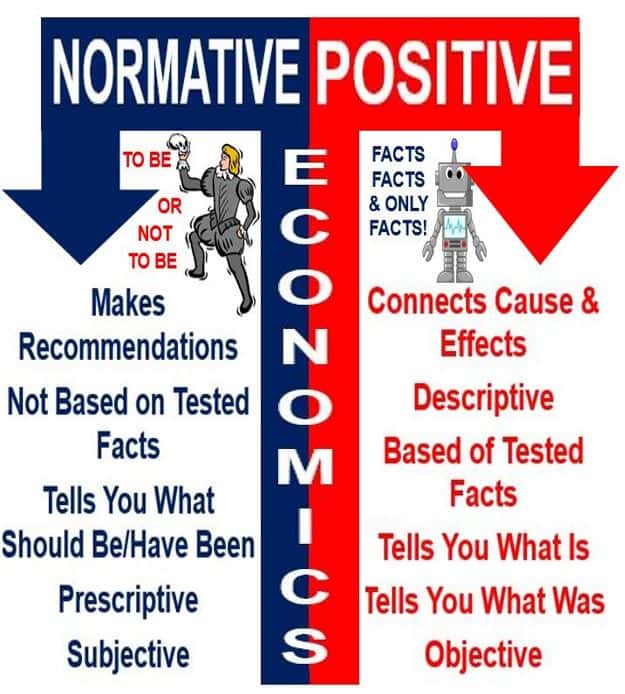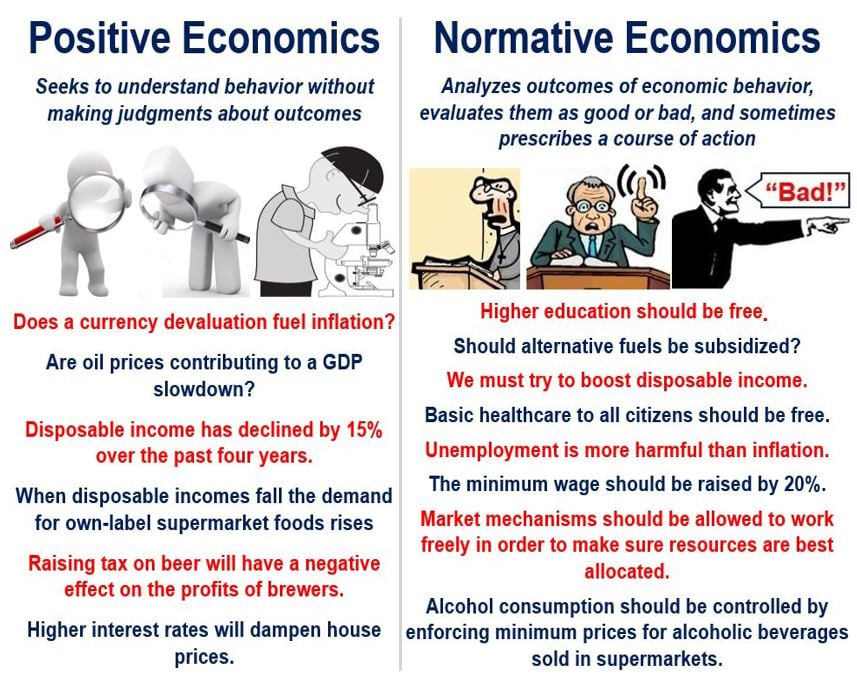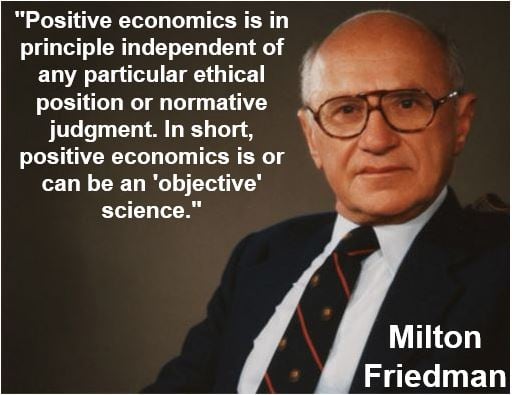Normative economics looks at how the economy should be or should have been rather than how it actually is or was – it suggests policies for improving economic welfare. Normative means relating to an ideal model or standard, or based on what is considered to be the correct or normal way of doing something.
It is a part of economics that expresses value (normative judgments) regarding economic fairness, or what the economic outcome or goals of public policy ought to be.
Normative economics is the side of economics that’s focused on what should happen. It’s about making suggestions or creating policies to improve the economy and people’s lives.
In contrast, positive economics just describes how things are, without trying to change them. So, while positive economics might say, “Here’s what’s happening,” normative economics says, “Here’s what we should do about it.”

While normative economics talks about what ought to be, positive economics deals only with what is (facts).
Positive vs. normative economics
Normative economics contrasts with positive economics, which aims to describe the economic world as it really is, instead of trying to prescribe ways to improve it.
The normative economist tries to determine the desirability-undesirability of various economic conditions, situations or programs by asking the question: “What ought to or should be/have been?” The positive economist asks: “What is/was/has been?”
While positive economics gathers and analyzes real data – about things that happen or have happened – normative economics relies heavily on value judgments and theoretical scenarios that present subjective results, i.e. how things should be or should have been.
Normative economics tells us what things would be like or would have been like if public policy were or had been different.

Difference between positive and normative economics.
Normative statements usually deliver an opinion on economic scenarios instead of providing an objective analysis that presents proven facts.
Positive Economics
Tells you how it is/was
Normative Economics
Tells you how it should/ought to be or should/ought to have been
Whoever is using normative economics in an argument is usually trying to change economic policies or to influence the decision-making process of lawmakers or captains of industry. (Captains of industry are people who head large and influential companies)
Is normative economics constructive?
Normative economics can be extremely useful if it is used by people who are trying to generate new ideas from a series of perspectives – if they aim to trigger real improvements, and they understand the key components of economics and how wealth is created.
However, it cannot ever become the only basis for making important decisions – decisions that affect whole countries, regions or the world – because it does not take an impartial/objective angle that concentrates on real cause-and-effects – in other words, facts.
If normative economics is used purely to criticize a political party, government or policymaker – crying over spilled milk – its usefulness is zero; no good ever comes of this type of approach.
Decision-makers tend to analyze the results of positive economic studies before making their decisions. They will sometimes look at what is desirable (or not) for the people they represent. In such cases, normative economics will play a part when they decide on economic matters.

Milton Friedman (1912-1912) was born in Brooklyn, New York, USA. He was awarded the 1976 Nobel Memorial Prize in Economic Sciences. He was one of the leading intellectuals of the ‘Chicago School’, and also an early promoter of monetarism. (Image: famouseconomists.net)
Example of normative economics
Imagine we are looking at scenarios in which the government reduced income taxes by 50%:
– A Normative Economic Statement may include the following words:
“The government should reduce income tax by 50%. It would help millions of people by increasing their disposable incomes.”
– A Positive Economic Statement: may include these words:
“While a 50% cut in income tax would help many workers and their families, current government budget constraints make that option both impossible and unfeasible.”
The normative economic statement carries value judgments – it assumes that people’s disposable income levels must be raised.
Normative economic statements are not tested – they are not proven by factual values or any cause and effect that has been legitimized.
The vast majority of economists today concentrate on positive economic analysis – they use ‘what is’ or ‘what was/has been’ occurring in the economy as the basis for any forecasts.
